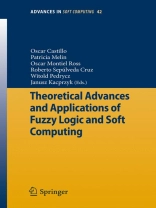This book comprises a selection of papers from IFSA 2007 on theoretical advances and applications of fuzzy logic and soft computing. These papers were selected from over 400 submissions and constitute an important contribution to the theory and applications of fuzzy logic and soft computing methodologies. Soft Computing c- sists of several computing paradigms, including fuzzy logic, neural networks, genetic algorithms, and other techniques, which can be used to produce powerful intelligent systems for solving real-world problems. The papers of IFSA 2007 also make a c- tribution to this goal. This book is intended to be a major reference for scientists and engineers interested in applying new fuzzy logic and soft computing tools to achieve intelligent solution to complex problems. We consider that this book can also be used to get novel ideas for new lines of research, or to continue the lines of research proposed by the authors of the papers contained in the book. The book is divided in to sixteen main parts. Each part contains a set of papers on a common subject, so that the reader can find similar papers grouped together. Some of these parts are comprised from the papers of organized sessions of IFSA 2007 and we thank the session’s organizers for their incredible job on forming these sessions with invited and regular paper submissions.
Jadual kandungan
Intuitionistic Fuzzy Sets and Their Applications.- The Application of Fuzzy Logic and Soft Computing in Flexible Quering.- Philosophical and Human-Scientific Aspects of Soft Computing.- Search Engine and Information Processing and Retrieval.- Perception Based Data Mining and Decision Making.- Soft Computing in Medical Sciences.- Joint Model-Based and Data-Based Learning: The Fuzzy Logic Approach.- Fuzzy/Possibilistic Optimization.- Algebraic Foundations of Soft Computing.- Fuzzy Trees.- Soft Computing in Petroleum Applications.- Fuzzy Logic and Soft Computing in Distributed Computing.- Fuzzy Logic Theory.- Fuzzy Logic Applications.- Neural Networks.- Soft Computing.












